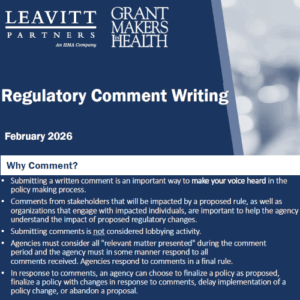Policy Resource: Regulatory Comment Writing
This resource provides an overview of how to write and submit a regulatory comment to the federal register.
A Profile of Foundations Created from Health Care Conversions
This report is the tenth in the GIH series that tracks and reports on the emergence and activities of health foundations formed from transactions involving hospitals, health plans, or health systems. The survey of foundations created from health care conversions collects basic information regarding the year of transaction, geographic location, assets, tax status, and focus of grantmaking.
Effects of the Economic Crisis on Health Foundations
The United States is experiencing its most severe economic crisis since the Great Depression, a crisis of global proportions with effects well beyond our borders. The subprime mortgage crisis, a volatile stock market, and job losses have taken a serious toll on the nation’s economy and the welfare of our most vulnerable communities.
2009 Terrance Keenan Award Acceptance Speech
Read about Mr. Yates’ groundbreaking work at The California Wellness Foundation and be inspired by his leadership as he guided his organization through unchartered territories and spearheaded a new approach to grantmaking.
A Tribute to Terrance Keenan at the 2009 Annual Meeting Seeing the Future with 20/20 Vision
Terrance Keenan, a founder of Grantmakers In Health (GIH), passed away on February 25 at the age of 85. Known for his leadership, innovation, and compassion, Mr. Keenan was a generous, consummate grantmaker whose career spanned more than 50 years in philanthropy, 46 of which were spent with the Robert Wood Johnson Foundation.
School-Based Health Centers: Enabling Health Care Access for Children and Youth “Where They Are”
School-based health centers serve over 2 million students attending U.S. public schools each year and can help reduce health-related absences and support students to be healthy and ready to learn in the classroom.
Behavioral Health and Public Policy
Behavioral health advocates ended a decade-long push for equity within private health insurance plans that cover mental health and addiction services with the passing of a new law that requires group health insurers to offer coverage for mental illness and substance use disorders on the same terms as physical illnesses.
CHIP Reauthorization: Details and Implications
This Issue Focus article summarizes a February 2009 Grantmakers In Health audio conference, which discussed the Children’s Health Insurance Program Reauthorization Act of 2009 and featured Cindy Mann, executive director of the Center for Children and Families at the Georgetown University Health Policy Institute.
Join & Become a GIH Funding Partner Today!
Click here to learn more about becoming a GIH Funding Partner and joining the largest national network of health funders.

